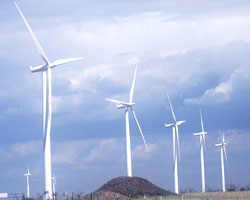Changing the Tax Code to Benefit Renewables

Overhauling the tax system, if it follows a new plan put forward by the Obama administration, would mean rolling back tax credits for the oil and gas industry and making them permanent for renewable energy. The proposal is called “The President’s Framework for Business Tax Reform” and in addition to boosting renewable energy, it seeks to close many existing corporate tax loopholes and subsidies while also cutting the corporate tax rate to spur growth. The research found, for instance that taxes vary widely by industry—“from a low of 14 percent average tax rate for utilities to a 31 percent average tax rate for construction.”
Eliminating oil and gas preferences in the current tax code is one of many tax loopholes and expenditures that the proposal would cut. Specifically: “The Framework would repeal tax preferences available for fossil fuels. This includes, for instance, repealing the expensing of intangible drilling costs, a provision that allows oil companies to immediately write-off these costs rather than recovering the cost over time as for most capital investments in other industries. This also includes repealing percentage depletion for oil and natural gas wells, which allows certain oil producers and royalty owners to recover the cost of oil and gas wells based on a percentage of the income they earn from selling oil and gas from the property rather than on the exhaustion of the property. Percentage depletion allows deductions that can exceed the cost of the property.”
In all, the reforms would cut some $39 billion in oil and gas tax breaks over the next decade. But an article on The Hill notes that “the plan is largely a political statement because the administration in all probability lacks enough support in Congress to kill the incentives.”
The tax reforms seek to spur American manufacturing and innovation, in particular with clean energy development in an effort to produce 80% of U.S. electricity from clean sources by 2035. That includes making a tax credit for renewable energy like wind and solar permanent. The former approach—a partial and temporary production tax credit for renewable energies “has created an uncertain investment climate, undermined the effectiveness of our tax expenditures, and hindered the development of a clean energy sector in the United States.”
The site EarthTechling writes that this would primarily benefit wind power, which depends every two years on Congress extending a 2.1 cents per kilowatt-hour subsidy. This production tax credit is due to expire again this year and its uncertain nature hurts investment and industry growth over the long term.
Courtney Abrams, clean energy advocate for Environment America says: “The Obama administration’s newly released plan for tax reform takes bold steps towards leveling the playing field for clean, renewable energy. Analyses show that subsidies to fossil fuels have traditionally dwarfed those to renewable energy. By cutting tax breaks to oil and gas companies – who for decades have profited at the expense of our health and environment – and instead investing in burgeoning clean energy industries, the administration recognizes that we can both grow our economy and ensure a future with cleaner air and water for all Americans.”

